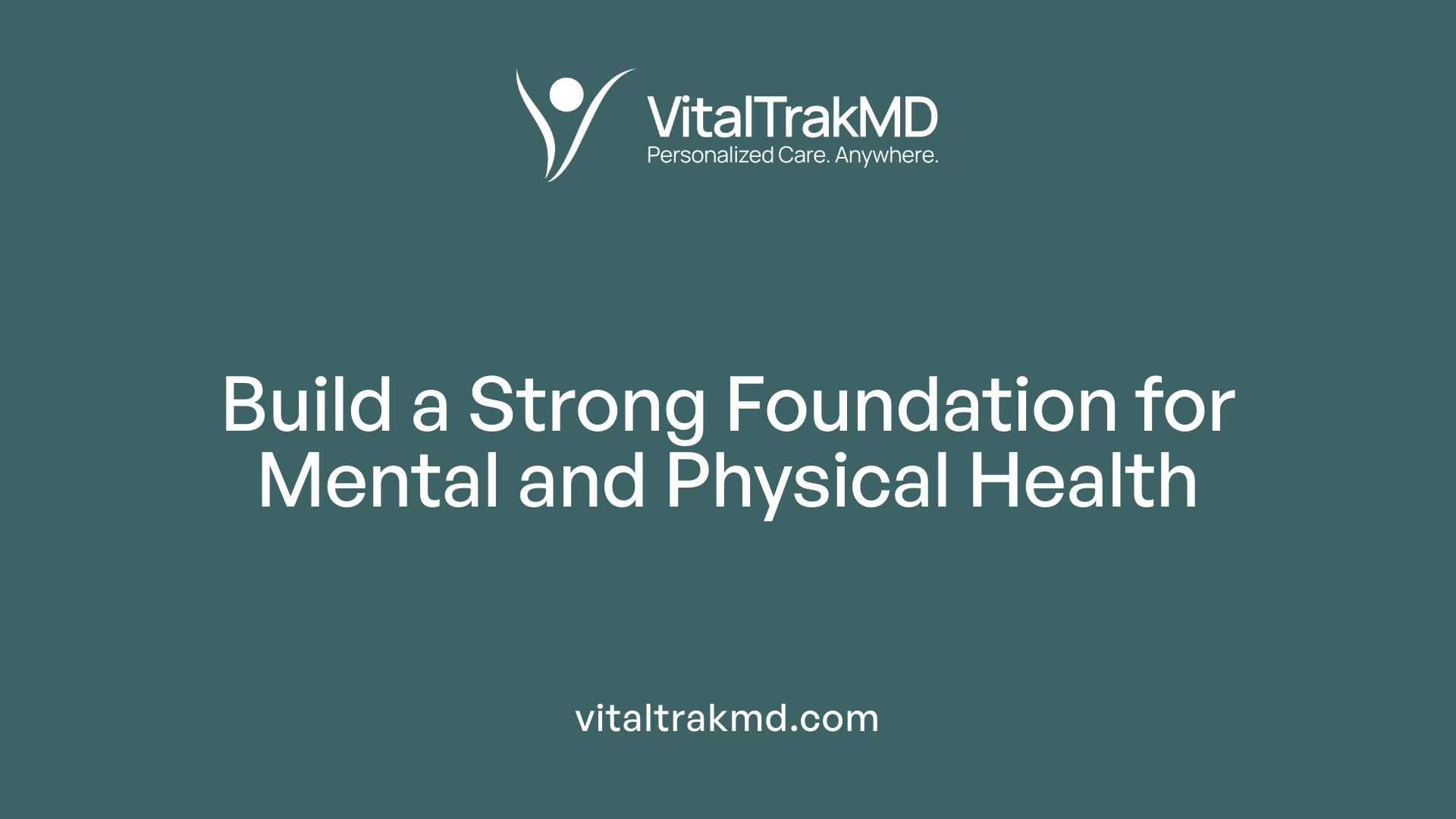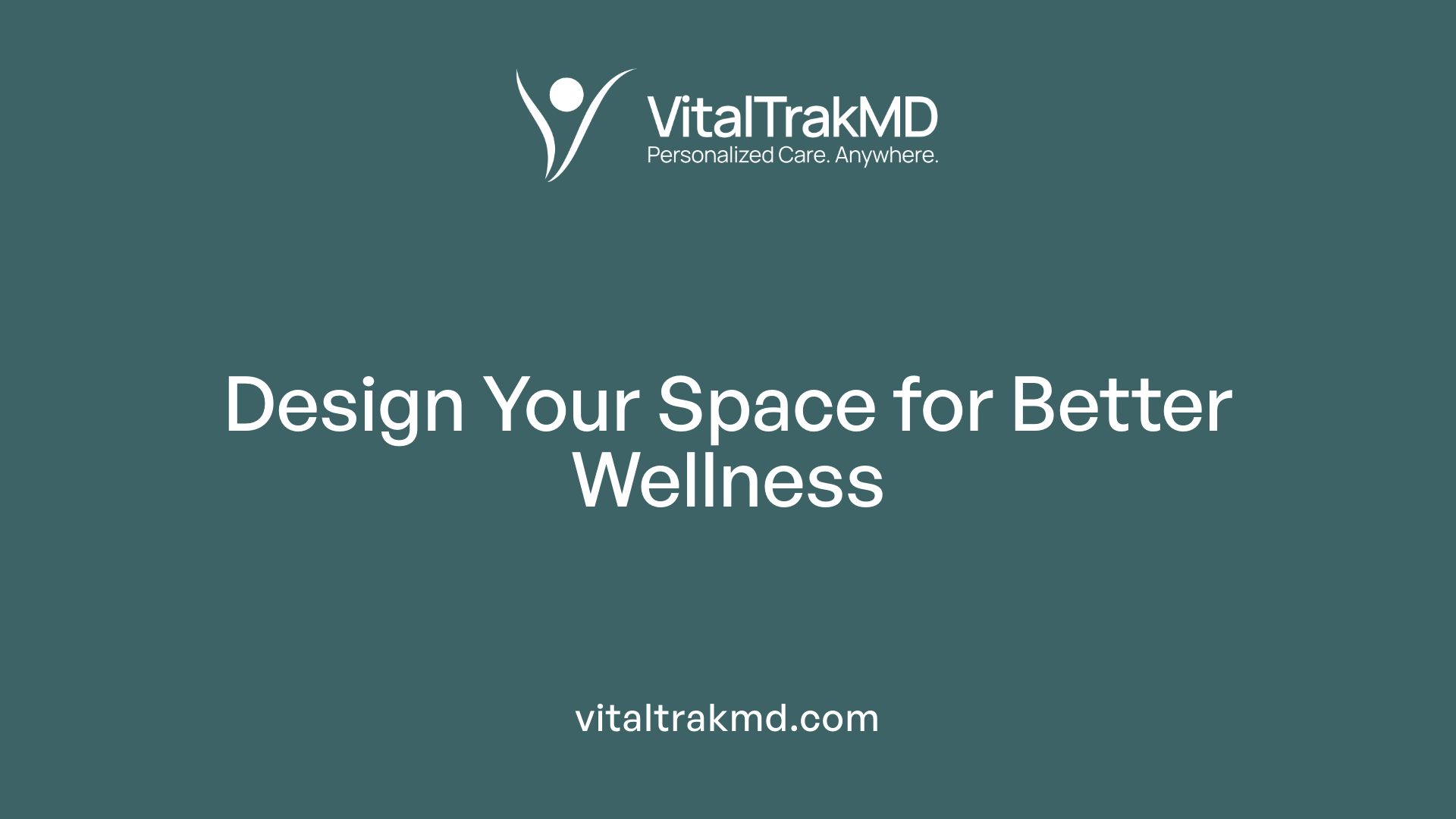Building Daily Routines for Better Wellness with Hybrid Support

Why Structured Routines Are Key to Holistic Health
Establishing effective daily routines can significantly enhance mental and physical well-being. In an increasingly unpredictable world, especially with hybrid work models, hybrid support methods and adaptable routines empower individuals to stay balanced, resilient, and healthy. This article explores practical strategies to build manageable, sustainable routines that prioritize self-care, mindfulness, and physical activity, supporting overall wellness during stressful times.
The Foundations of an Effective Wellness Routine

Why is having a daily routine important for mental health and overall well-being?
Creating a daily routine is fundamental for maintaining mental health and overall wellness because it offers stability, predictability, and a sense of control. This structure helps reduce stress and anxiety by minimizing decision fatigue and providing clear expectations for the day. Consistent routines improve sleep quality, regulate eating habits, and support regular physical activity, all of which have positive effects on mood and emotional resilience.
A well-established routine also promotes the development of healthy habits, making it easier to sustain positive behaviors over time. Routine activities such as exercise, nutritious eating, and self-care reinforce a balanced lifestyle, preventing issues like fatigue and emotional disturbance. Overall, routines foster mental clarity, emotional stability, and physical health, laying a strong foundation for a resilient mind and body.
What are practical strategies for establishing and maintaining healthy daily habits?
Implementing effective strategies for healthy habits involves starting small and building gradually. Developing morning and evening routines, like waking early, engaging in physical activity, and practicing good sleep hygiene, sets a positive tone for the day. Using tools such as checklists, habit trackers, or digital reminders can reinforce consistency.
Prioritizing achievable goals helps create momentum, while breaking down large habits into manageable steps prevents overwhelm. Scheduling regular activities, like meal planning and exercise, ensures they become integral parts of daily life. Additionally, establishing routines that are flexible and adaptable allows you to modify habits according to changing circumstances, making it easier to stay committed long-term.
How can routines support mental and physical health throughout the day?
Consistent routines serve as pillars of mental and physical well-being by providing structure that alleviates stress and creates a sense of order. Regular sleep schedules improve mood, focus, and immune function. Incorporating physical activity like walking or yoga releases endorphins that elevate mood and reduce stress.
Throughout the day, scheduled breaks for mindfulness, deep breathing, or simple stretching activities help maintain mental clarity and prevent burnout. Making time for social interactions and personal reflection enhances emotional health. Setting priorities and boundaries prevents overload, while habits like gratitude journaling boost resilience. These structured behaviors collectively foster a balanced lifestyle, improving both mental and physical health over time.
What are some effective ways to incorporate self-care, mindfulness, and exercise into daily routines?
Starting with achievable goals is crucial – for example, dedicating five minutes to mindfulness meditation or enjoying a short walk. Consistency is key; scheduling these activities at the same time each day helps turn them into habits. For self-care, activities like relaxing baths, skincare, or reading can be integrated into morning or evening routines.
Practicing mindfulness can involve deep breathing exercises, body scans, or gratitude journaling, which reduce stress and increase focus. Incorporating mild physical activities, such as stretching, yoga, or brisk walking, can boost mood with minimal effort.
To sustain these habits, use reminders or pairing techniques, known as habit stacking—attaching new habits to existing routines. Regular reflection on what activities work best helps adapt routines to personal preferences, ensuring they support mental and physical health effectively.
What are some tips for creating manageable routines that promote mental wellness?
Design routines that are realistic and tailored to your lifestyle. Start with small, specific habits like drinking a glass of water after waking or stretching after sitting for long periods. Maintaining consistency with sleep, meals, and activity times creates a stable daily rhythm.
Incorporate enjoyable activities—such as hobbies, social times, or outdoor walks—to boost motivation and happiness. Use visual cues or alarms to remind you of habits, and celebrate small milestones.
Flexibility and self-compassion are vital; allow room for adjustments and forgive setbacks. Regularly review your routines, making tweaks as needed to keep them supportive and sustainable. Focusing on progress, not perfection, invites long-term adherence and boosts mental wellness.
How do structured routines benefit overall health and well-being?
Structured routines underpin good health by establishing consistent practices like balanced eating, exercise, and adequate sleep. These habits support physical health, improve immune function, and reduce the risk of chronic diseases.
Mentally, routines decrease ambiguity and help manage stress by creating predictable environments. They also reduce decision fatigue, lowering anxiety and elevating emotional stability. Over time, routines cultivate positive habits that reinforce well-being, making it easier to avoid unhealthy behaviors.
Emotionally, routines facilitate social interactions and foster a sense of purpose, increasing resilience and life satisfaction. They also support recovery from stress or mental health challenges by providing familiar anchors during difficult times.
What are some lifestyle strategies that support mental and physical health through daily habits?
Practices such as regular physical activity—like walking, cycling, or yoga—effectively reduce stress and depression symptoms. Maintaining a nutritious diet rich in fruits, vegetables, and lean proteins supports brain health and energy levels.
Prioritizing sleep hygiene by establishing consistent bedtime routines enhances mental clarity and emotional stability. Mindfulness techniques such as meditation or deep breathing, practiced regularly, boost resilience.
Building social connections through interactions with loved ones or community groups enhances psychological health. Managing stress with activities like outdoor time, journaling, or hobbies sustains mental wellness. Hydration and limited consumption of alcohol or caffeine further uphold physical vitality.
How can routines be adapted to support wellness during stressful times?
During stress, simplifying routines and emphasizing self-care can alleviate pressure. Incorporating stress-reduction activities,—like brief meditation, gentle exercise, or nature walks—provides relief.
Flexibility is essential; adjust routines by reducing complexity or lengthening transition periods. Focus on primary habits such as eating balanced meals, sleeping consistently, and staying hydrated, which support resilience.
Gradually adding new wellness activities, like virtual social meetings or creative pursuits, fosters a sense of accomplishment. Self-compassion, patience, and reflection enable effective adaptation in challenging circumstances.
Creating a supportive environment by decluttering spaces and scheduling regular breaks can also enhance mental health during stressful periods. Engaging with trusted social networks and seeking professional help when needed further strengthen coping strategies.
Creating a Supportive Environment for Routine Success
 Establishing and maintaining effective routines is essential for fostering mental, emotional, and physical health. A crucial aspect of solidifying these routines involves organizing your physical space to promote clarity and focus.
Establishing and maintaining effective routines is essential for fostering mental, emotional, and physical health. A crucial aspect of solidifying these routines involves organizing your physical space to promote clarity and focus.
How does organizing your physical space support wellness routines?
A tidy and well-arranged environment minimizes distractions, helps maintain focus, and creates a calming atmosphere conducive to healthy habits like meditation, work, or relaxation. Decluttering your space, integrating natural elements such as plants, and designating specific areas for work, exercise, and self-care encourage consistency and make it easier to stick to routines. Additionally, keeping healthy foods visible and accessible while minimizing clutter in the kitchen can promote better eating habits.
How can technology support your daily routines?
Leveraging technology can significantly enhance routine adherence. Using habit-tracking apps, calendar reminders, and digital alarms can reinforce consistent behaviors. Virtual fitness classes, meditation apps, and online support groups provide accessible resources to integrate movement, mindfulness, and social connection into daily life. Automating repetitive tasks, like grocery shopping through online orders or setting medication reminders, reduces effort and decision fatigue.
Why eliminate distractions in your environment?
Distractions such as notifications, background noise, or clutter can interrupt focus and diminish the effectiveness of routines. Turning off non-essential notifications during work or self-care sessions and creating designated quiet zones can help maintain concentration. Limiting screen time and establishing rules for device use during meals or relaxation periods supports mindfulness and reduces stress.
Practical tips for creating a wellness-friendly environment
- Allocate specific areas for sleeping, working, and relaxing
- Keep essential items within reach to minimize effort
- Use natural light to boost mood and regulate sleep cycles
- Establish a digital detox zone free from screens at least one hour before bed
- Add calming sensory elements, like scented candles or soft music
By carefully designing your environment, you create a foundation that supports consistent, intentional habits and encourages a balanced lifestyle. This space becomes a catalyst for building routines that enhance your overall well-being and resilience.
| Aspect | Tips | Benefits |
|---|---|---|
| Organizing Physical Space | Declutter, designate spaces, incorporate natural elements | Reduces distractions, promotes calm |
| Technology Support | Use habit trackers, reminders, online resources | Reinforces consistency, increases motivation |
| Eliminating Distractions | Turn off notifications, create quiet zones | Improves focus and mindfulness |
In summary, a well-curated environment complements your routines, making healthy habits more accessible, sustainable, and effective.
Building a Supportive Environment for Routine Success
 Establishing a daily routine is fundamental for maintaining mental health and overall wellness. It offers stability and predictability, which can significantly reduce stress and anxiety. When your day is structured, it supports better sleep patterns, regular nutritious meals, and consistent physical activity, all of which boost mood and resilience. Routines foster the development of healthy habits over time, making it easier to stick to positive behaviors and avoid chaos. Consequently, a balanced routine nurtures clarity, emotional stability, and physical health.
Establishing a daily routine is fundamental for maintaining mental health and overall wellness. It offers stability and predictability, which can significantly reduce stress and anxiety. When your day is structured, it supports better sleep patterns, regular nutritious meals, and consistent physical activity, all of which boost mood and resilience. Routines foster the development of healthy habits over time, making it easier to stick to positive behaviors and avoid chaos. Consequently, a balanced routine nurtures clarity, emotional stability, and physical health.
One of the practical strategies for making routines sustainable is organizing your physical space. A clutter-free environment enhances focus and calmness, reducing mental clutter and distractions. For example, creating designated areas for work, relaxation, and self-care activities helps your brain associate specific spaces with specific routines. Natural lighting, comfortable furniture, and organized storage all contribute to a space that encourages regular habits like exercising, reading, or meditating. When your environment supports your routines, maintaining those habits becomes less of a challenge.
Using technology can also reinforce daily habits efficiently. Habit-tracking apps, reminders, and calendar alerts serve as digital anchors that remind you of your routines. Notifications for hydration, movement breaks, or meditation sessions help reinforce consistency. Some apps even reward streaks, boosting motivation. Combining technology tools with your routine ensures that crucial habits are not forgotten, and progress is visually tracked, fostering a sense of achievement.
Eliminating distractions is vital for routine stability. Many daily routines are interrupted by habits like excessive screen time or multitasking, which can reduce focus and add to stress. Creating dedicated, distraction-free spaces for work or relaxation, turning off non-essential notifications, and setting specific times for checking emails or social media help restore concentration. Small adjustments like using website blockers or acoustic noise devices also contribute to minimizing interruptions. Staying focused during scheduled activities ensures that routines are completed effectively, reinforcing positive habits.
Here’s a summary table highlighting these strategies:
| Strategy | Practical Examples | Benefits |
|---|---|---|
| Organizing physical space | Declutter workspace, create dedicated zones, improve lighting | Enhances focus, reduces stress, promotes routine consistency |
| Using technology | Habit-tracking apps, reminders, calendar alerts | Reinforces habits, improves accountability, visual progress tracking |
| Eliminating distractions | Turn off notifications, use noise-canceling devices, set specific times for social media | Improves focus, reduces mental clutter, makes routines more effective |
Incorporating these elements creates a supportive environment that makes sticking to healthy routines easier and more sustainable. With well-organized spaces, digital tools, and minimized distractions, developing and maintaining habits becomes a natural part of daily life, fostering long-term wellness and resilience.
Embracing Flexibility for Lasting Wellness
Building effective daily routines that incorporate self-care, mindfulness, and physical activity can profoundly impact your mental and physical health. By establishing manageable, consistent habits, and adapting routines to fit individual needs and circumstances, especially during stressful times, you can foster resilience and improve overall well-being. Hybrid support methods—such as using digital tools, creating supportive environments, and prioritizing social connections—further enhance routine adherence. Remember, flexibility, patience, and self-compassion are essential in sustaining routines that promote long-term health and happiness. Start small, stay steady, and transform your daily life into a balanced, wellness-oriented journey.
References
- Start a Daily Routine to Support Your Health & Wellbeing
- Health Benefits of Having a Routine - Northwestern Medicine
- How to create the best daily routine: 10 simple habits for success
- The Power of Routine: How Daily Habits Improve Mental Health
- The Importance of Creating Habits and Routine - PMC
- Tips for Including Healthy Habits into Your Daily Routine
- 10 Daily Habits for Mental Wellness | St. Luke's Penn Foundation
- Improving Employee Well-being in a Hybrid Model of Working
- 3 Expert-Backed Tips for Building Mental Health Routines That Stick
- Building a Routine That Supports Your Mental and Physical Health
Recent articles
Want to Feel Better and Live Healthier?
Join hundreds of patients taking control of their health with personalized care that fits their life – not the other way around.
Rated 4.8/5 by 32+ customers







